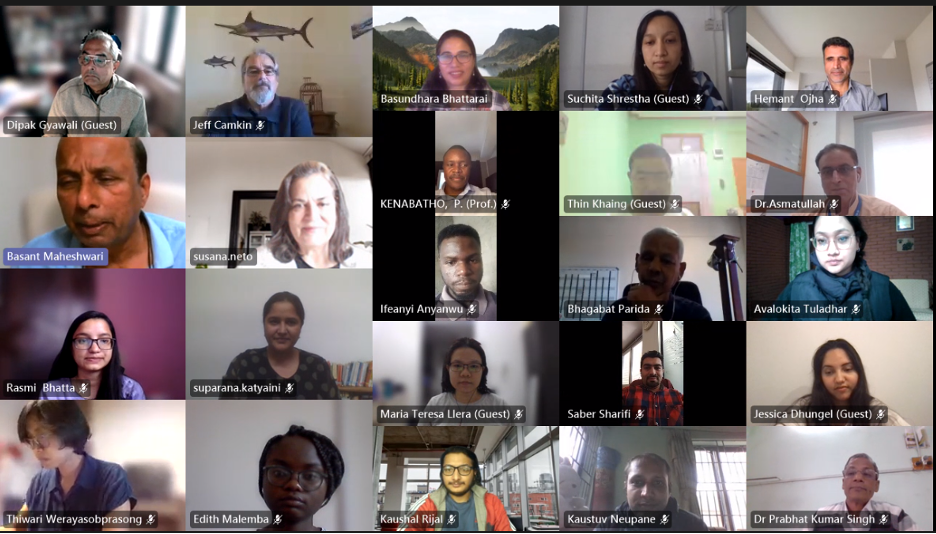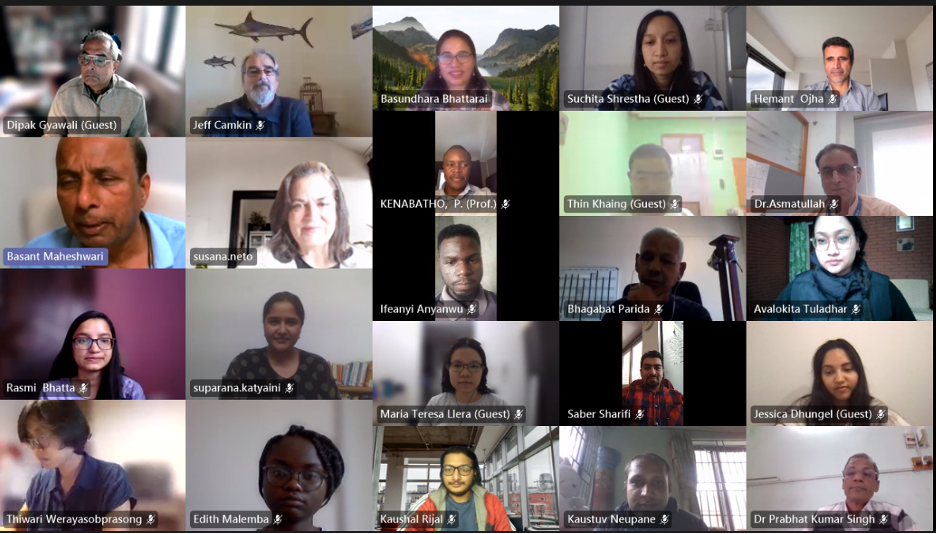By Mae Thiwari
November 18, 2021 – Professor of Water Engineering and Management, Mukand S. Babel, at the Asian Institute of Technology (AIT) shared his experience of shaping policy for water resources management with peers from around the world at the second Water Policy Lab (WPL) Forum.
The virtual exchange of experience in connection with policy on water management was hosted by the Institute for Study and Development Worldwide (IFSD), in partnership with World Water Policy (WWP), Australia-India Water Centre (AIWC), University of Botswana, and AIT. With the theme of the discussion being “Co-creating knowledge, policy, and practice for water security under a changing climate,” the aim of this forum is to share knowledge and insights on how to facilitate policy and practical innovation to tackle problems of water management to secure sustainable ecosystem and equitable livelihoods.

Joining the discussion were Prof. Piet Kenabatho, University of Botswana; Mr. Dipak Gyawali, Pragya (Academician) Nepal Academy of Science and Technology (NAST); Prof. Mukand S. Babel, AIT; and Prof. Susana Neto, Portugal. All four speakers brought with them extensive experience and insights around their role and active engagement in water policy and governance. The forum collectively brings influences from Asia, Australia, Africa, and Europe.
In addition to teaching, research, and consulting for over three decades, Prof. Mukand S. Babel is leading the Climate Change Asia Initiative at AIT for catalyzing capacity for action to address the climate change issues in the region. From sharing personal experience of working on water problems to sharing views on tackling challenges in water management, here are the key takeaways from Prof. Babel’s open and reflective stories of practice.
Research-informed Policy
The Integrated Water Resources Management (IWRM) curriculum was first introduced in Asia at AIT in 1999 by Prof. Babel with Prof. Ashim Das Gupta, Emeritus Professor at AIT. Given AIT’s unique position since its inception in providing technical assistance and capacity building, which contribute to the development of the region, Prof. Babel shared how his work has influenced policy through research projects conducted in collaboration with various international organizations and government agencies. Among many examples provided, one showed how the findings through seven years of research had led to a recommendation adopted by the policymakers, to help restore the groundwater situation in Bangkok aquifer systems by increasing the charge for groundwater use to control pumping by the industries.
From making policy recommendations on water management through research, Prof. Babel’s personal journey continued to include work on impact and adaptation to tackle climate change, and ultimately to the area of water security. To this end, the issue of trade-offs among different water users, especially in the agriculture and environment sectors, poses a real challenge of finding a balance between human for development and nature for preserving ecosystems. With respect to research and policy, his view on this is to find a way to quantify the impact of various water policies on water security. Believing that, “we cannot have a completely risk-free water secure society, so we need to define the acceptable level of risk which would depend on different contexts and circumstances.”
Trade-offs in Water Allocation
Having developed a water allocation tool to help the Thai authorities (Royal Irrigation Department and the Electricity Generating Authority of Thailand) allocate water to different use-sectors during the dry season, based on economic, social, and environmental criteria – Prof. Babel shared an insight on how “trade-offs” can be made by understanding the problem before finding a solution. To do this, his approach is to engage with the relevant government agencies and other stakeholders from the beginning in defining the research questions and continuously work with them to find an acceptable solution. He added that, “we need more of action research, rather than academic research to address real water problems.”
3Ps and 3Es in IWRM
Since the “Integrated Water Resources Management” (IWRM) has been around now for decades, and we are still facing water problems. Question was raised on how IWRM could be more effective. To this, Prof. Babel explained there must be 3Ps to achieve 3Es -- the 3Ps or three pillars in IWRM are 1) enabling environment, 2) institutional roles, and 3) the management instruments, and the 3Es are 1) equity, 2) efficiency, and 3) ecological sustainability.
Prof. Babel stressed the importance of “integration” and “we should move towards transdisciplinary approach in research and education; we should try to link the policy from the perspective of integration.”
The Gap between Water Policy and Practice and Science
Going back to the importance of “integration,” Prof. Babel explained that “Integration means coordination, communication, and engagement with appreciation,”.
Integration does not mean brining relevant institutions/organizations under one umbrella, he cautioned, as it will never and should not happen as it is not practical and feasible. By learning how to integrate academics, policies and institutions through coordination, communication and appreciation of others, the gap can be bridged.
Trigger for a Change
Economic loss can be a good trigger for a change. Prof. Babel gave an example of how the 2011 great flood of Thailand, with an estimated cost of damage of $45 billion US dollars, forced the government to revisit their policies, plans and projects related to water and flood management. He is currently working on a project that addresses challenges of both flood and drought in an integrated manner in the Min River Basin funded by the UK government. He is an advisor/expert to another project related to water demand management and financing of water supply and sanitation in the Eastern Economic Corridor (EEC), which is the backbone of GDP contribution to Thailand.
All four speakers agreed “a trigger is required for a change.” Do not let a disaster go away without introducing a change for good, it was concluded. The Forum was chaired by Dr. Basundhara Bhattarai, and the session was moderated by Prof. Jeff Camkin. Prof. Basant Maheshwari concluded the session highlighting the key takeaways.
The Water Policy Lab Forum II was organized by Institute for Study and Development Worldwide (IFSD) in collaboration with Australia India Water Centre (AIWC), World Water Policy journal, Asian Institute of Technology, and University of Botswana.
For further further information, please contact Prof. Mukand Babel.

